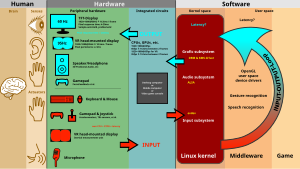This article needs additional citations for verification. (November 2010) |

Responsiveness as a concept of computer science refers to the specific ability of a system or functional unit to complete assigned tasks within a given time.[1] For example, it would refer to the ability of an artificial intelligence system to understand and carry out its tasks in a timely fashion.[2]
In the Reactive principle, Responsiveness is one of the fundamental criteria along with resilience, elasticity and message driven.[3]
It is one of the criteria under the principle of robustness (from a v principle). The other three are observability, recoverability, and task conformance.
- ^ Weik, Martin H. (31 December 2000). Computer science and communications dictionary. Springer. p. 1484. ISBN 978-0-7923-8425-0. Retrieved 17 November 2010.
- ^ University of Tennessee (System). Space Institute; SIGART. (1988). Proceedings: the first International Conference on Industrial & Engineering Applications of Artif[i]cial Intelligence & Expert Systems : IEA/AIE-88 at the University of Tennessee Space Institute (UTSI), Tullahoma, Tennessee, June 1-3, 1988. Taylor & Francis US. p. 180. ISBN 978-0-89791-271-6. Retrieved 17 November 2010.
- ^ Jonas Bonér; Dave Farley; Roland Kuhn; Martin Thompson (September 16, 2014). "The Reactive Manifesto (v2.0)".